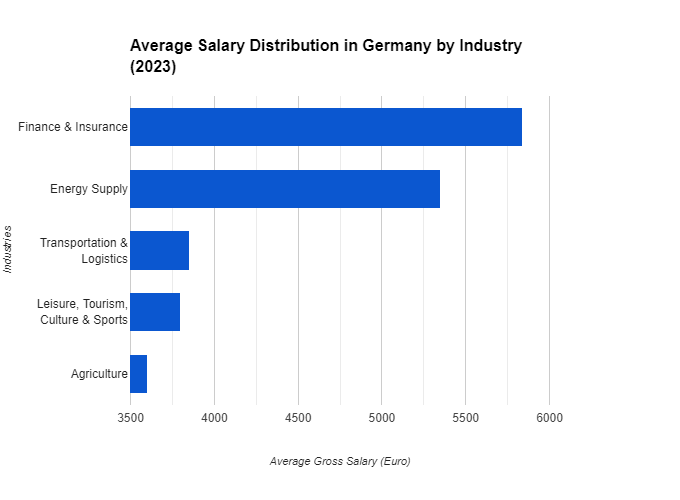
What is the Average Salary in Germany?
The average gross salary in Germany in 2023 was €4,323 per month, translating to a yearly salary of €51,876. These figures are based on data from the Federal Statistical Office of Germany and consider full-time employees.
Is a German Salary Good?
Compared to other European countries, Germany’s average salary falls within the upper-middle range. However, it’s crucial to consider that the cost of living, particularly in major cities, is also relatively high.
Average Salary in Germany by Industry

What’s the Net Salary in Germany?
Your net income depends on various factors like your tax class, marital status, and health insurance. On average, a single person might take home around €2,986 net per month after taxes and social security contributions.
How to Increase Your Salary in Germany?
Several strategies can help you raise your salary in Germany. Here are some of the most important factors:
- Work Experience: As your experience grows, so does your potential salary.
- Qualifications: Higher qualifications, like a university degree or additional training, can lead to a higher salary.
- Industry: Specific industries, such as finance and insurance or IT, generally offer higher salaries.
- Management Positions: Managers typically earn more than employees without supervisory roles.
- Region: Salaries tend to be higher in metropolitan areas and major cities compared to rural regions.
How is Purchasing Power Developing in Germany?
Germany’s purchasing power has steadily increased over recent years. In 2024, purchasing power per capita is expected to reach €27,848. This signifies that Germans can purchase more goods and services with their income.
How Does Salary Affect Purchasing Power?
Salary is naturally a significant factor influencing purchasing power. The higher your salary, the more you can afford.
What Other Factors Play a Role?
Besides salary, other factors like the prices of goods and services, inflation, and tax burden also impact purchasing power.
How Big is the Gender Pay Gap in Germany?
The Gender Pay Gap, the difference in wages between men and women, remains an issue in Germany. In 2023, the unadjusted Gender Pay Gap stood at 18%. This means women earn, on average, €4.46 per hour less than men.
What Causes the Gender Pay Gap?
Several factors contribute to the Gender Pay Gap. Here are some of the key reasons:
- Occupational Segregation: Women and men often work in different industries and professions. Women tend to be employed in lower-paying sectors like care or education.
- Part-Time Work: Women are more likely to work part-time than men. This results in them earning less overall.
- Career Breaks: Women take career breaks more frequently than men, for instance, due to pregnancy and childcare. This can negatively affect their salary and career progression.
How Can We Close the Gender Pay Gap?
Various measures are necessary to reduce the Gender Pay Gap. These include:
- Encouraging Women in STEM Fields: Women should be actively supported in pursuing careers in Science, Technology, Engineering, and Mathematics (STEM).
- Expanding Childcare: Extending childcare options would make it easier for women to work full-time.
- Equal Pay for Equal Work: Women and men performing the same work should fundamentally receive the same salary.
Conclusion: Salary and Purchasing Power in Germany
Salary and purchasing power in Germany depend on various factors, including industry, work experience, qualifications, management positions, and region.
The Gender Pay Gap persists as a problem in Germany. Implementing various measures is necessary to bridge this gap.


